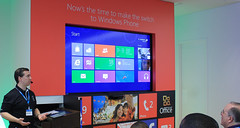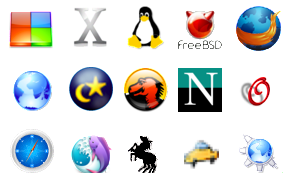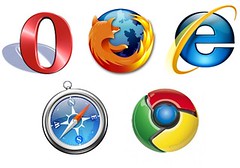 |
| Courtesy of Flickr |
The Past Tells a Tale
| Usage share of web browsers according to StatCounter, Chrome was 23.16% in August 2011. |
The Emergence of a New Giant
Windows 8 and What it Means
| Windows 8 on the big screen! |
“Windows 8 is a computer science
masterpiece trapped inside a user interface kerfuffle
Legal Battles are Won and Lost
| EU vs. Microsoft Monopoly (Photo credit: |
“Microsoft used to give
its users the opportunity to choose the web browser, when they installed
Windows 7 operating system, in line with an agreement reached with the European
Union in 2011. According to European Commission, however, between May 2011 and
July 2012, over 15 million EU customers were not given that opportunity, owing
to what Microsoft classified as a ‘technical glitch’ made by its software
engineering team.”
Glitch or not, Microsoft’s
actions and the resulting fine harken
Microsoft is also not averse
to firing a few shots across the bows of competitors, as Google found out it
was pulled into a patent lawsuit that could lead to a ban of Google maps in
Germany.
According to Florian Muller
of FOSS Patents, “Microsoft’s EP0845124
patent in Europe is for a “computer system for
identifying local resources and method therefor” and was issued in 1996. The
issue was discussed in a regional court in Munich today and as Mueller notes,
it doesn’t look like Google was able to convince the judge “that the patent is
highly probable to be invalidated at the end of a parallel nullity proceeding.”
Should Microsoft win the
injunction, Google would be forced to shut down its mapping service in Germany
on both PC and mobile networks. It could
also be ordered to stop selling Chrome in Germany unless it blocks German users
from accessing Google Maps.
Speaking of Outcomes, What about FireFox and Safari?
| Browsers (Photo credit: Wikipedia) |
Apple’s Safari usage growth
is not going up. Although Safari has been available for most computer
platforms, its adoption rate is dismal. Having said that, it performs is good
and its stability is excellent. You would expect no less from an apple product.
Anyone who creates web pages need to have a copy of Safari on their system.
This lets them see how their web page design looks on apple computers, tablets
and other Apple smart devices.
What is Opera?
The fifth browser is Opera.
It has such a small share of the overall browser market, which for some barely
worth mentioning. However, a diverse market is a healthy market. As a browser,
Opera is full featured and has good performance. In essence, it does most things
very well. I always like having at least the top five browsers on my system
just in case my primary browsers get infected with malware or they stop working
due to a bad update. Having said that I
While the outcome of the latest
iteration of the browser wars is anything but certain, the battle for the
hearts and minds of the web surfing public is so lucrative that this clash of
the titans could result in total domination by one of the combatants. Or, it could leave the door open to yet up-start,
who realizes that this is the perfect time to stage coup because the other
browser superpowers are too engaged, in a take-no-prisoners brand of warfare to
be paying attention.
In this article, I covered the ongoing saga of the browsers wars past and present. I have laid out
the current conflict as it stands today and have discussed the current
positions of the dominant players, their new weapons and their never ending legal
issues. The reader can see where the current battles are headed. If you liked this article please
 If you like this article, you can find more by typing in ”Internet security" in the search box at the top left of this blog. If you found this article useful, share it with your friends, families and co-works. If you have a comment related to this article, leave it in the Comment sections below. If you would like a free copy of our book, "Internet Marketing Tips for the 21st Century," fill out the form below.
If you like this article, you can find more by typing in ”Internet security" in the search box at the top left of this blog. If you found this article useful, share it with your friends, families and co-works. If you have a comment related to this article, leave it in the Comment sections below. If you would like a free copy of our book, "Internet Marketing Tips for the 21st Century," fill out the form below.
Related articles
 If you like this article, you can find more by typing in ”Internet security" in the search box at the top left of this blog. If you found this article useful, share it with your friends, families and co-works. If you have a comment related to this article, leave it in the Comment sections below. If you would like a free copy of our book, "Internet Marketing Tips for the 21st Century," fill out the form below.
If you like this article, you can find more by typing in ”Internet security" in the search box at the top left of this blog. If you found this article useful, share it with your friends, families and co-works. If you have a comment related to this article, leave it in the Comment sections below. If you would like a free copy of our book, "Internet Marketing Tips for the 21st Century," fill out the form below.
Since 1995, Carl Weiss has been helping
Related articles














No comments:
Post a Comment